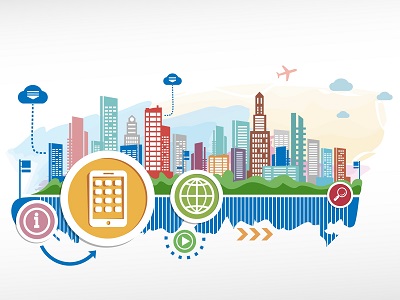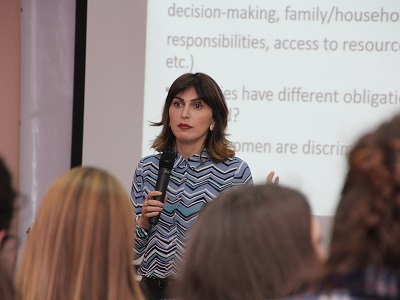On June 12, ISET hosted Kinan Bahnassi of the International Labor Organization, one of several UN-affiliated bodies active in Georgia. Mr. Bahnassi treated the audience of students, staff and faculty to an interesting, perceptive and rather creative presentation.
Mr. Bahnassi began by explaining that although the ILO presence in Georgia is comparatively small compared to other organizations, it has had a significant impact in the country. He drew particular attention to the lack of a national labor code, and the fact that many people working in the country (particularly those in manual jobs) face hazardous conditions. This issue is particularly poignant for Georgians, since loss of life in the building industry and mining is – while not common – still too much of a regular occurrence. However, thanks to the ILO’s efforts, health and safety standards on construction sites will be introduced later this year, with appropriate attire and helmets becoming mandatory.
Although Georgia has made significant strides on its developmental path over the last decade, and its ambitions to fully join Western bodies such as NATO and the European Union no longer seem a far-fetched dream, there are sectors of society which have not benefited from the full attention and aid given to other areas.
The life of disabled people anywhere is, of course, unimaginably hard, but in Georgia matters are even more complicated. The country’s economy has barely been strong enough to support its able-bodied population, let alone those with special needs. After Georgia signed the United Nations’ Convention on the Rights of Persons with Disabilities in 2014, progress has been made, and the situation is not as dire as it once was; disabled access to buildings and public spaces is becoming increasingly common, but significant challenges remain.
On April 3, ISET hosted a knowledge-sharing event by ADB Regional Gender Consultant, Ketevan Chkheidze. The public lecture (which was entitled ‘Gender in Development: Practices, Challenges and Opportunities’) was dedicated to the issue of developing gender equality in the context of Georgia. Specifically, the lecture covered key gender trends in development, where they stand in terms of advancing gender equality and women’s empowerment, as well as practices and approaches in this process and the benefits of considering gender issues in a developing democracy like Georgia.
In addition, drawing on the examples of the ADB’s operation, the practices of integrating gender in development work in different sectors were shared to the audience. Discussing the case of Georgia, the lecture also emphasized the role of different stakeholders, along with the challenges and opportunities in facilitating equal access to and equal participation in development processes.













